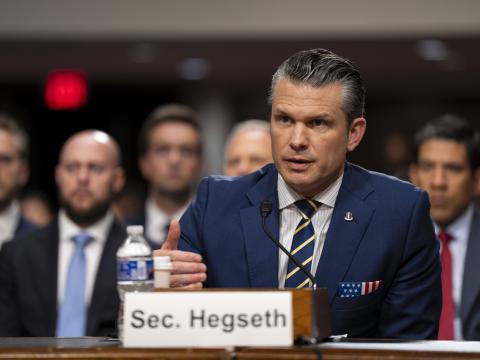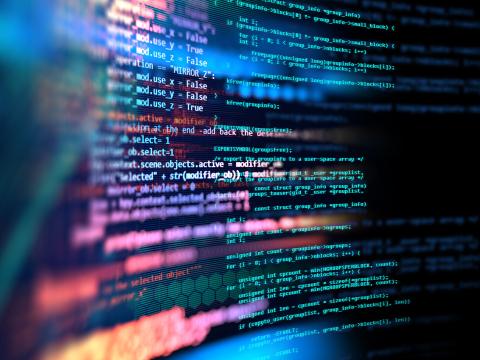IT'S NOT A BAILOUT FOR THE IC BUT IT IS AN OPPORTUNITY FOR THE DNI
Throughout the month of September there was a considerable amount of media attention focused on the President’s Comprehensive National Cyber Initiative (CNCI). Given the importance of cyber to our national security, the extant threats and vulnerabilities, as well as the complex policy and questions about who should lead the government’s cyber efforts, I thought this would be a good topic for AFCEA’s monthly intel blog. When I saw what the national economic crisis did to the Presidential and Vice Presidential debates it occurred to me that talking about the intelligence issues associated with CNCI, as important as they are, is not what most people care about right now.
As critical as cyber is to our national security its has not been much on my mind since the economic crisis manifested itself with Bernanke and Paulsen’s dire warnings to the Congress on 18 September. When I am not thinking about the dropping value of my home, the hit to my 401K, the viability of my life insurance company, or the safety of my savings at Wachovia, I find myself contemplating the impact of the financial crisis on national security in general and the intelligence community in particular. My day job, after all, is IC business development.
You don’t have to read the Wall Street Journal or listen to CNBC to know that the U.S. economy is in serious trouble and the way both Presidential campaigns are actively avoiding the topic except for “I am the guy that won’t let this happen again” platitudes tells me nobody from the government or private side is really confident that they know the depth of problems or what to do about them. Additionally I find it dumbfounding that now almost three weeks into this crisis both Senators Obama and McCain have been reluctant to say how they would voted on the Bailout Legislation (it passed the Senate on 02 October with both candidates voting yea) nor claim they have a plan for resolving the economic woes of the nation. If my investment statements were not enough, all this says this must really be bad!
Well, what does really bad mean for the IC? First it won’t be as bad for any agency that depends on a federal budget line item for its revenue as compared to the private sector because the government can either print or borrow the money it needs to meet budget in a way no profit and loss company can. That said, we are a democracy and people who vote (let alone those who fund politicians) are reasonably going to expect the IC along with the rest of government to curtail its spending except were it helps the economy. At $60 billion a year the IC’s economic impact is chump change where there are concerns about $700 billion being sufficient to stabilize let alone right the situation.
I kept hearing during the Congressional debate that the $700 billion was to be cash neutral to the government ------ in the long run ---- but FY 09 and 10 are the short run and money will tougher to come by. On top of a new FY with a lame duck administration and an economy that is in desperate straits because of debt as baby boomers continue to draw Social Security in increasing numbers and tax revenues decrease because of recession, there are some “evitable surprises” IC NIP Program mangers should be thinking about for FY 09:
- Economic and political realities will insure already flat IC budgets won’t be augmented in FY 09 as any extra money goes to mitigate bailout costs and FY 10 grows less than inflation.
- Borrowing an additional $700 billion dollars in less than a year will drive interest rates up and the value of the dollar down which means:
- Program taxes should be expected to cover this unbudgeted increase in debt service costs.
- Because of the lack of liquidity in the U.S. most new government debt instruments will be bought by sovereign wealth funds.
- As a result of depressed stock prices and a dollar weakened by increased debt, U.S. companies (especially mid-tier IT firms) will become attractive take over targets for foreign firms.
- IC Acquisition Executives and Comptrollers will be reluctant to greenlight large multi-year programs due to funding sustainability risks while existing big buck programs get stretched.
So how is the IC likely to react to this stark fiscal environment? First it’s important to remember since 50% of the IC workforce has been brought on since 9/11 they have seen nothing but double digit growth year over year in the IC budget with supplementals. It will also be the first downturn in spending under the DNI construct, which was not as successful as I thought it would be in asserting control over the IC’s budget while they were rising. All this suggests to me that it is reasonable to expect the IC’s historic disjointed and conservative response to the budget challenges ahead ------ unless the DNI with strong backing from both the White House and the Congress in the name of fiscal necessity can assert control over the NIP at the agency/program level to cut under performing efforts to insure funding for successful and essential efforts. It is also a funding environment that should encourage consolidation of shared services (data centers, financials, training, etc.) across the IC, enterprise wide licensing of widely used software, and investment in improved processes.
Finally, beyond the immediate impacts of the financial crisis on the IC’s top line, the IC should be considering the national security implications of the crisis in order to focus the collective minds of the new Congress and Administration. With increased foreign ownership of American debt and corporate equities what are the risks that our financial system can be used against the interests of the United States? With attention riveted on watching financial markets and a sense that there is no money to act, which foreign adversaries are likely to sense opportunity where? How does this economic crisis impact trade and security alliances?
On balance I see the current national financial crisis presenting the DNI with two attractive opportunities
1. To proactively seize macro-management control of the NIP for the fiscal good of the nation AND more rational management of the IC.
2. To provide “decision advantage” about the national security impacts of the financial crisis to keep the President and the Congress energized to make the difficult choices essential to getting the US economy out of shoal waters.
Executed well both opportunities can increase the influence and relevance of the DNI.
That’s what I think; what do you think?




Comment
This is as good a time as any
Bill is right! One of the
Comments